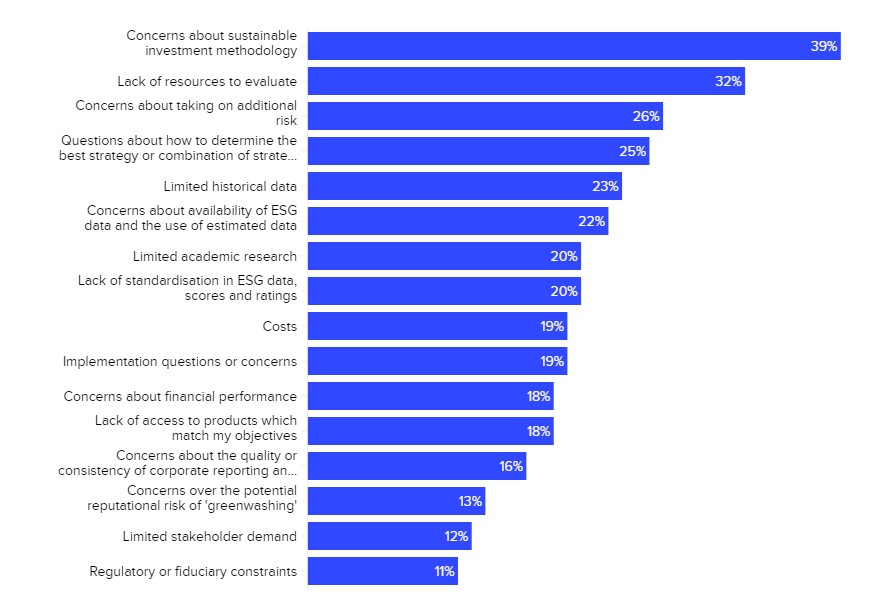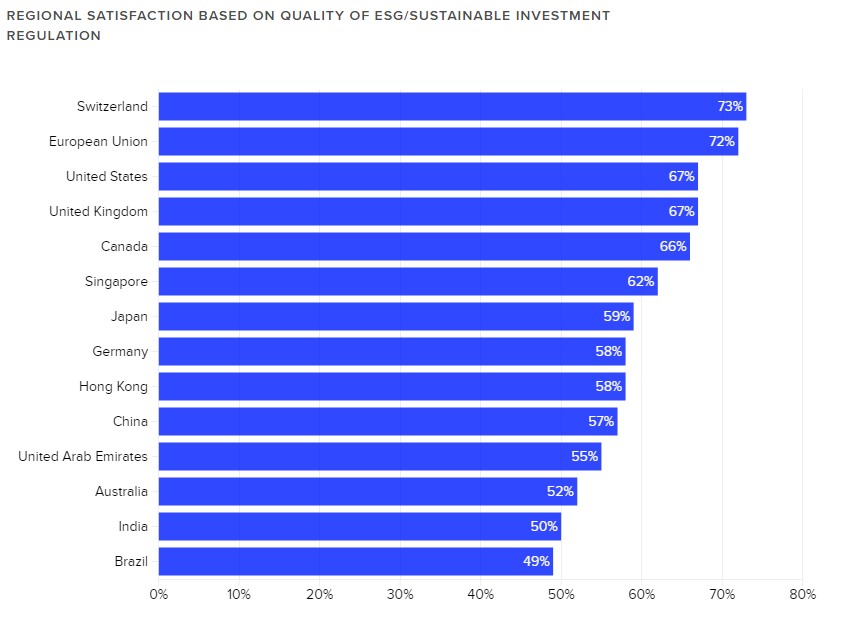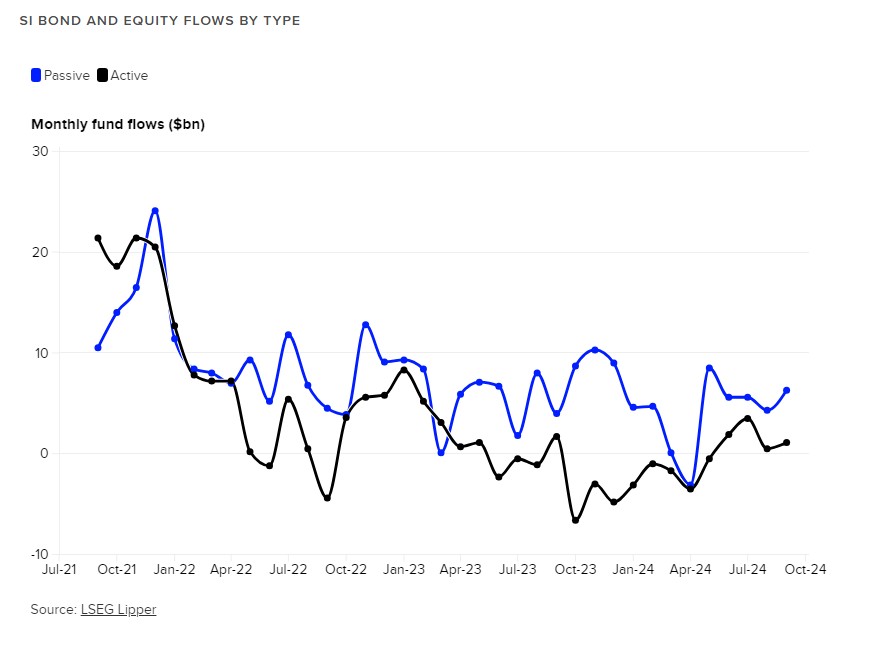By: Lee Clements, Head of Applied Sustainable Investment Research
As Sustainable Investment matures and mainstreams, how are the challenges evolving?
Sustainable investment is becoming a more conventional investment strategy, as the market moves past barriers such as data provision and evolving regulations. But this mainstreaming brings new challenges: sustainable investment products and approaches are now becoming subject to more conventional types of investor scrutiny, around strategies, methodologies and risk and return.
These are some of the findings we have gleaned from FTSE Russell’s 2024 sustainable investment asset owner survey, our eighth annual examination of global asset owners’ sentiment towards and approaches to sustainable investment. We surveyed more than 300 investors around the world, diversified by location and size, to better understand how they are thinking and acting when it comes to sustainable investment.
Regulation, data recede as issues
The clearest development in this year’s survey is that headwinds that asset owners faced from sustainable investment regulation and data have largely abated. Last year, 50% of respondents cited concerns about the availability of ESG data and the use of estimated data as barriers to increased sustainable investment adoption; this year, that figure had fallen to 22%.
Similarly, 37% complained about the lack of standardization in ESG data, scores and ratings – this year, that figure was 20% (see Figure below).

Source: FTSE Russell Sustainable Investment Asset Owner Survey – 2024 • Question: What barriers to increased sustainable investment adoption across asset classes do you perceive?
Segment – Currently implementing, evaluating, or plan to evaluate sustainable investment (Total n=229)
Regulation is also proving to be less significant a barrier to the uptake of sustainable investment. In the 2023 survey, 25% of respondents said that regulation did not help them meet their sustainable investment goals “very well” or “at all”. This year, the percentage had fallen to 10%.
In fact, a majority of respondents said that they are satisfied with the quality of ESG/sustainable investment regulation in every major market relevant to them, except India and Brazil (see Figure below). For those answering on European Union and the United States, 72% and 67% of respondents agreed with the statement.

Source: FTSE Russell Sustainable Investment Asset Owner Survey – 2024 • Question: How satisfied are you with the following regions based on the quality of their ESG/sustainable investment regulation: Rated 4 or 5 on a 5 point scale
Segment – Currently implementing sustainable investment considerations and familiar with that region’s ESG/sustainable investment regulation (variable based per region; n=173-194)
These two trends may be connected. Growing regulatory intervention has increased the provision of high-quality ESG data by companies, has improved standards among ESG data providers, and has increased standardization across the market.
A shift to passives
Another proof point for greater investor comfort with sustainable investment is the finding that, for the first time, more investors are implementing sustainable investment strategies in their passive portfolios than their active ones (by 66% to 61%).
The previous preference of investors for active managers to pursue sustainable investment reflected how those managers moved first in offering sustainable investment strategies: index providers have since caught up and are clearly winning the confidence of investors. This is also likely to be driven by a combination of cost and scale. Asset owners who are moving large parts of their portfolios to sustainable investment strategies are more likely to favor lower-cost indexes than more expensive active managers.
Fund flows support the findings of our survey. We have seen significantly greater inflows to passive than active sustainable investment funds over the previous 12 months.

Sustainable investment on its own terms
However, as the sustainable investment market overcomes some of its idiosyncratic issues, it faces new challenges. Investors are increasingly considering sustainable investment strategies and products as they would any other investment theme – and want to better understand the underlying methodologies, risk profiles and the appropriate asset allocations.
We are seeing this in the European funds marketplace, in particular. Now 61% of fund AUM are designated as Article 8 or 9 funds, under the Sustainable Finance Disclosure Regulation (SFDR), meaning that they integrate sustainable investment characteristics to a greater or lesser extent.
The survey showed that the main barriers to increase sustainable investment adoption raised by respondents can be considered as more ‘traditional’ concerns that investors would be likely to raise about any investment strategy. They included concerns about sustainable investment methodologies, concerns about taking on additional risk and questions about how to determine the best strategy or combination of strategies.
Some challenges remain
But the investors we surveyed tell us that there remain some challenges created by regulation. There are still definitional issuers faced by providers – as shown with the European Securities and Markets Authority’s guidelines on the names of funds using sustainability-related terms, and the SFDR. Addressing these can divert resources from offering or managing investment products.
In addition, just over half (51%) of respondents claim the biggest challenge to meet regulatory requirements is the inability to align their investments with regulatory requirements around sustainable investing/climate. For example, alignment with the EU’s Paris Aligned Benchmark requires an index to deliver an annual decarbonisation of 6-7%; our research has found that, while the top 25% of companies are broadly in line with that objective, the median reduction is at zero. This makes it challenging for broad-based indexes to demonstrate alignment, challenging for broad-based indexes to demonstrate alignment.
However, overall, this year’s Asset Owner Survey shows a market that is becoming increasingly mature, with investors engaging with sustainable investment on its own terms. It is coming of age as an approach to investing that promises to surface risks that have hitherto been overlooked by the broader market and identify opportunities from the emerging green economy.
Originally posted on November 7, 2024 on FTSE Russell blog
PHOTO CREDIT: https://www.shutterstock.com/g/funyphoto
VIA SHUTTERSTOCK
DISCLOSURES:
All information is provided for information purposes only. All information and data contained in this publication is obtained by LSEG, from sources believed by it to be accurate and reliable. Because of the possibility of human and mechanical inaccuracy as well as other factors, however, such information and data is provided “as is” without warranty of any kind. No member of LSEG nor their respective directors, officers, employees, partners or licensors make any claim, prediction, warranty or representation whatsoever, expressly or impliedly, either as to the accuracy, timeliness, completeness, merchantability of any information or LSEG Products, or of results to be obtained from the use of LSEG products, including but not limited to indices, rates, data and analytics, or the fitness or suitability of the LSEG products for any particular purpose to which they might be put. The user of the information assumes the entire risk of any use it may make or permit to be made of the information.
Past performance is no guarantee of future results. Charts and graphs are provided for illustrative purposes only. Index and/or rate returns shown may not represent the results of the actual trading of investable assets. Certain returns shown may reflect back-tested performance. All performance presented prior to the index or rate inception date is back-tested performance. Back-tested performance is not actual performance, but is hypothetical. The back-test calculations are based on the same methodology that was in effect when the index or rate was officially launched. However, back-tested data may reflect the application of the index or rate methodology with the benefit of hindsight, and the historic calculations of an index or rate may change from month to month based on revisions to the underlying economic data used in the calculation of the index or rate.
This document may contain forward-looking assessments. These are based upon a number of assumptions concerning future conditions that ultimately may prove to be inaccurate. Such forward-looking assessments are subject to risks and uncertainties and may be affected by various factors that may cause actual results to differ materially. No member of LSEG nor their licensors assume any duty to and do not undertake to update forward-looking assessments.
No part of this information may be reproduced, stored in a retrieval system or transmitted in any form or by any means, electronic, mechanical, photocopying, recording or otherwise, without prior written permission of the applicable member of LSEG. Use and distribution of LSEG data requires a licence from LSEG and/or its licensors. Read in detail here.



